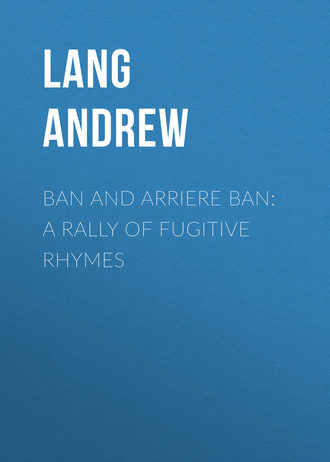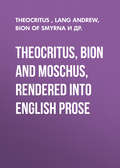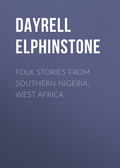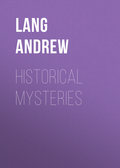полная версия

Lang Andrew
Ban and Arriere Ban: A Rally of Fugitive Rhymes
CELIA’S EYES
PASTICHE
Tell me not that babies dwell
In the deeps of Celia’s eyes;
Cupid in each hazel well
Scans his beauties with surprise,
And would, like Narcissus, drown
In my Celia’s eyes of brown.
Tell me not that any goes
Safe by that enchanted place;
Eros dwells with Anteros
In the garden of her Face,
Where like friends who late were foes
Meet the white and crimson Rose.
BRITANNIA
FROM JULES LEMAÎTRE
Thy mouth is fresh as cherries on the bough,
Red cherries in the dawning, and more white
Than milk or white camellias is thy brow;
And as the golden corn thy hair is bright,
The corn that drinks the Sun’s less fair than thou;
While through thine eyes the child-soul gazeth now —
Eyes like the flower that was Rousseau’s delight.
Sister of sad Ophelia, say, shall these
Thy pearly teeth grow like piano keys
Yellow and long; while thou, all skin and bone,
Angles and morals, in a sky-blue veil,
Shalt hosts of children to the sermon hale,
Blare hymns, read chapters, backbite, and intone?
GALLIA
Lady, lady neat
Of the roguish eye,
Wherefore dost thou hie,
Stealthy, down the street,
On well-booted feet?
From French novels I
Gather that you fly,
Guy or Jules to meet.
Furtive dost thou range,
Oft thy cab dost change;
So, at least, ’tis said:
Oh, the sad old tale
Passionately stale,
We’ve so often read!
THE FAIRY MINISTER
The Rev. Mr. Kirk of Aberfoyle was carried away by the Fairies in 1692
People of Peace! a peaceful man,
Well worthy of your love was he,
Who, while the roaring Garry ran
Red with the life-blood of Dundee,
While coats were turning, crowns were falling,
Wandered along his valley still,
And heard your mystic voices calling
From fairy knowe and haunted hill.
He heard, he saw, he knew too well
The secrets of your fairy clan;
You stole him from the haunted dell,
Who never more was seen of man.
Now far from heaven, and safe from hell,
Unknown of earth, he wanders free.
Would that he might return and tell
Of his mysterious Company!
For we have tired the Folk of Peace;
No more they tax our corn and oil;
Their dances on the moorland cease,
The Brownie stints his wonted toil.
No more shall any shepherd meet
The ladies of the fairy clan,
Nor are their deathly kisses sweet
On lips of any earthly man.
And half I envy him who now,
Clothed in her Court’s enchanted green,
By moonlit loch or mountain’s brow
Is Chaplain to the Fairy Queen.
TO ROBERT LOUIS STEVENSON
WITH KIRK’S ‘SECRET COMMONWEALTH’
O Louis! you that like them maist,
Ye’re far frae kelpie, wraith, and ghaist,
And fairy dames, no unco chaste,
And haunted cell.
Among a heathen clan ye’re placed,
That kensna hell!
Ye hae nae heather, peat, nor birks,
Nae trout in a’ yer burnies lurks,
There are nae bonny U.P. kirks,
An awfu’ place!
Nane kens the Covenant o’ Works
Frae that o’ Grace!
But whiles, maybe, to them ye’ll read
Blads o’ the Covenanting creed,
And whiles their pagan wames ye’ll feed
On halesome parritch;
And syne ye’ll gar them learn a screed
O’ the Shorter Carritch.
Yet thae uncovenanted shavers
Hae rowth, ye say, o’ clash and clavers
O’ gods and etins – auld wives’ havers,
But their delight;
The voice o’ him that tells them quavers
Just wi’ fair fright.
And ye might tell, ayont the faem,
Thae Hieland clashes o’ our hame
To speak the truth, I takna shame
To half believe them;
And, stamped wi’ Tusitala’s name,
They’ll a’ receive them.
And folk to come ayont the sea
May hear the yowl o’ the Banshie,
And frae the water-kelpie flee,
Ere a’ things cease,
And island bairns may stolen be
By the Folk o’ Peace.
FOR MARK TWAIN’S JUBILEE
To brave Mark Twain, across the sea,
The years have brought his jubilee;
One hears it half with pain,
That fifty years have passed and gone
Since danced the merry star that shone
Above the babe, Mark Twain!
How many and many a weary day,
When sad enough were we, ‘Mark’s way’
(Unlike the Laureate’s Mark’s)
Has made us laugh until we cried,
And, sinking back exhausted, sighed,
Like Gargery, Wot larx!
We turn his pages, and we see
The Mississippi flowing free;
We turn again, and grin
O’er all Tom Sawyer did and planned,
With him of the Ensanguined Hand,
With Huckleberry Finn!
Spirit of mirth, whose chime of bells
Shakes on his cap, and sweetly swells
Across the Atlantic main,
Grant that Mark’s laughter never die,
That men, through many a century,
May chuckle o’er Mark Twain!
III
POEMS
WRITTEN UNDER THE INFLUENCE OF WORDSWORTH
MIST
Mist, though I love thee not, who puttest down
Trout in the Lochs, (they feed not, as a rule,
At least on fly, in mere or river-pool
When fogs have fallen, and the air is lown,
And on each Ben, a pillow not a crown,
The fat folds rest,) thou, Mist, hast power to cool
The blatant declamations of the fool
Who raves reciting through the heather brown.
Much do I bar the matron, man, or lass
Who cries ‘How lovely!’ and who does not spare
When light and shadow on the mountain pass, —
Shadow and light, and gleams exceeding fair,
O’er rock, and glade, and glen, – to shout, the Ass,
To me, to me the Poet, ‘Oh, look there!’
LINES
Written under the influence of Wordsworth, with a slate-pencil on a window of the dining-room at the Lowood Hotel, Windermere, while waiting for tea, after being present at the Grasmere Sports on a very wet day, and in consequence of a recent perusal of Belinda, a Novel, by Miss Broughton, whose absence is regretted.
How solemn is the front of this Hotel,
When now the hills are swathed in modest mist,
And none can speak of scenery, nor tell
Of ‘tints of amber,’ or of ‘amethyst.’
Here once thy daughters, young Romance, did dwell,
Here Sara flirted with whoever list,
Belinda loved not wisely but too well,
And Mr. Ford played the Philologist!
Haunted the house is, and the balcony
Where that fond Matron knew her Lover near,
And here we sit, and wait for tea, and sigh,
While the sad rain sobs in the sullen mere,
And all our hearts go forth into the cry,
Would that the teller of the tale were here!
LINES
Written on the window pane of a railway carriage after reading an advertisement of sunlight soap, and Poems, by William Wordsworth.
I passed upon the wings of Steam
Along Tay’s valley fair,
The book I read had such a theme
As bids the Soul despair.
A tale of miserable men
Of hearts with doubt distraught,
Wherein a melancholy pen
With helpless problems fought.
Where many a life was brought to dust,
And many a heart laid low,
And many a love was smirched with lust —
I raised mine eyes, and, oh! —
I marked upon a common wall,
These simple words of hope,
That mute appeal to one and all,
Cheer up! Use Sunlight Soap!
Our moral energies have range
Beyond their seeming scope,
How tonic were the words, how strange,
Cheer up! Use Sunlight Soap!
‘Behold,’ I cried, ‘the inner touch
That lifts the Soul through cares!’
I loved that Soap-boiler so much
I blessed him unawares!
Perchance he is some vulgar man,
Engrossed in £ s. d.
But, ah! through Nature’s holy plan
He whispered hope to me!
ODE TO GOLF
‘Delusive Nymph, farewell!’
How oft we’ve said or sung,
When balls evasive fell,
Or in the jaws of ‘Hell,’
Or salt sea-weeds among,
’Mid shingle and sea-shell!
How oft beside the Burn,
We play the sad ‘two more’;
How often at the turn,
The heather must we spurn;
How oft we’ve ‘topped and swore,’
In bent and whin and fern!
Yes, when the broken head
Bounds further than the ball,
The heart has inly bled.
Ah! and the lips have said
Words we would fain recall —
Wild words, of passion bred!
In bunkers all unknown,
Far beyond ‘Walkinshaw,
Where never ball had flown —
Reached by ourselves alone —
Caddies have heard with awe
The music of our moan!
Yet, Nymph, if once alone,
The ball hath featly fled —
Not smitten from the bone —
That drive doth still atone;
And one long shot laid dead
Our grief to the winds hath blown!
So, still beside the tee,
We meet in storm or calm,
Lady, and worship thee;
While the loud lark sings free,
Piping his matin psalm
Above the grey sad sea!







